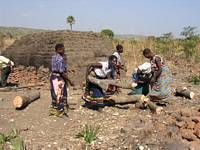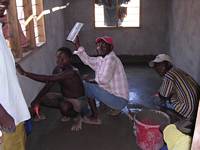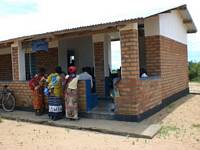Projects
In March 2009 St Mary’s Brookfield and the Medical Orchestra started the fundraising for a community health post inland from the Niassan Lakeshore at Mandambuzi. This is a really inspiring project - a model of community based development, and deserves to be built as soon as possible. Contributions to this project fund are welcomed. £11,000 is the total budget for the project - about £1000 had been raised by October 2009.
[Source: Dr Peg Cumberland Community Health Coordinator, Diocese of Niassa - October 2009]
Many thanks for your kind offer to raise funds for the Diocese of Niassa to construct a health post here in Mozambique. We were already very much hoping to build a new health post this year but financial problems caused by the world economic crises have meant that the Diocese health project's two principal donors have not been able to give us as much as they had hoped for 2009 and, at present, we have no funds for construction.



The health post is to be built in a community called Mandambuzi in Lago District, Niassa province. Lago District is an extremely remote area in the far north of Mozambique, bordering Tanzania. The Diocesan health project initially just served communities situated along 90 miles of the shore of Lake Malawi (Mozambicans call it Lago Niassa) but, in response to requests from people living in neighbouring areas, has gradually expanded to include communities up to six hours walk into the mountains adjoining the lake. The health post in Mandambuzi will be our first inland health post. 789 people live in the two communities immediately within the Mandambuzi area but the health post would also be used by some 800 or more people living in communities up to four hours walk away. At present the population of Mandambuzi have to walk three hours down the mountain to reach a mud hut where they can get paracetamol, antimalaria medicine and a first-line antibiotic. The next closest health facility is a five hour walk from Mandambuzi.
The community-run health posts like the one planned for Mandambuzi are very simple and are staffed by local, trained volunteers rather than fully qualified nurses but, because so many local children were previously dying from diseases, such as malaria, diarrhoea, pneumonia and malnutrition, which can be treated easily and cheaply if they are detected at an early stage, they have produced major improvements the health of local communities. Through the services offered by the health posts, together with the educational and advocacy work of the Diocese’ project, we have seen the mortality rate for children under five fall by 50% since the project began.
The methodology utilised by the Diocese for health post construction requires very high levels of community participation but, to date (the project has already built five community-run health posts and three maternity units), has produced excellent results - both with good quality buildings and in equipping local people with construction skills that have significantly improved the standard of housing built in the area and enabled some community members to find external employment.
First the construction coordinator meets with the community and explains the process. The community desiring a health post is asked to set up a committee to oversee the construction, choose the health post site and make and burn bricks. Once the bricks are ready the Diocese sends in a team of three construction trainers and invites about 20 local people to participate in a three-month construction course of which the practical component is to raise the health post. During the construction the rest of the community continue to help by supplying sand and water. As well as providing the construction trainers the Diocese also supplies a team of carpenters and all materials such as cement, roofing sheets and well-made doors and windows that are not locally available. During the construction the students receive a simple mid-morning snack of tea and bread and a lunch, usually of maize meal porridge and beans. At the end of the course each student receives a set of building tools to enable them to continue using the skills they have acquired. Building the health post with community participation in this way is not significantly cheaper than building it with paid labour but it has enormous benefits in terms of community ownership, on-going maintenance of the building and skills acquisition.
Both the community, the District Health Department and local government have been asking us to build a health post in Mandambuzi for the past four years. We already have a guarantee from the government that they will provide medicines for the health post, the community have already selected the site and made most of the bricks required (they are so eager to have a health post that they did this of their own initiative) and three community members have successfully completed the training to staff the health post. The principle barrier that remains to the opening of a health post is the funding for its construction.
The cost of construction here has increased greatly in the past two years with cement, and some other building materials, almost doubling in price and transport costs also going up. The total budget for the health post is £11,593 (based on the current costs) but we already have materials to a value of £963, remaining from other projects, making the total amount still to be raised £10,629. We hope to start building the health post in May. It is possible that there will be further price increases before then so ideally it would be good to have at least £11,000 available. The calculations I have made are based on keeping costs to an absolute minimum. If you suspect that £11,000 is more than it will possible for you to raise please let me know and I will continue the search for other donors. It is often easier for us to raise funds if we are able to form potential donors that some of the funds required are already available from another source.
I thought it might be helpful to you, when trying to raise funds, to know about an event that illustrates well the need for the health post. A couple of months ago a father from Mandambuzi came to see me with his 14 year-old son to ask me if there was anything we could do to help the child recover full health. The boy was very unsteady when walking and his speech was slow and awkward. The father told me that his son had been an active lively child until two years previously when he suddenly developed a fever. As the nearest health post was three hours walk away and, at that point, the child was not very sick, the family decided to wait to see if the fever would settle on its own. A day later the boy's condition suddenly deteriorated and he became confused and unable to walk. It was now clear to the family that he required medical help but, as he was incapable of making the long hike down the mountain, they delayed further. On the third day the child became unconscious. Afraid he would die his family and friends made a makeshift stretcher and carried him down the steep, rocky path to the lakeshore. He was finally transferred by boat to a small hospital on Likoma Island, Malawi, where he was treated for cerebral malaria. He recovered consciousness after a couple of days and was discharged home two weeks later but the delay in treatment had led to severe neurological damage and for three months he was unable to walk or feed himself. During this time his father kept him alive by placing small morsels of food in his mouth, washing and changing him. Over the past two years, with the help of a lot of loving care from his family, he has gradually recovered to his present state but he will never return to being a normally active child. Had there been a health post in Mandambuzi the boy would almost certainly have been treated with antimalarial tablets on day one and never have become seriously ill. Talking to the father I felt very sad that we had not managed to open a health post in the area before this event occurred. I hope very much that it will soon be possible.
I am sending you three photographs in a separate email. They are all of construction of health posts the Diocesan health project has already built. One shows local women preparing to burn bricks for a maternity unit; another shows some local construction students building a health post similar to the one we hope to build in Mandambuzi and another is of a completed similar health post.
With much appreciation for your offer of help,
Peg